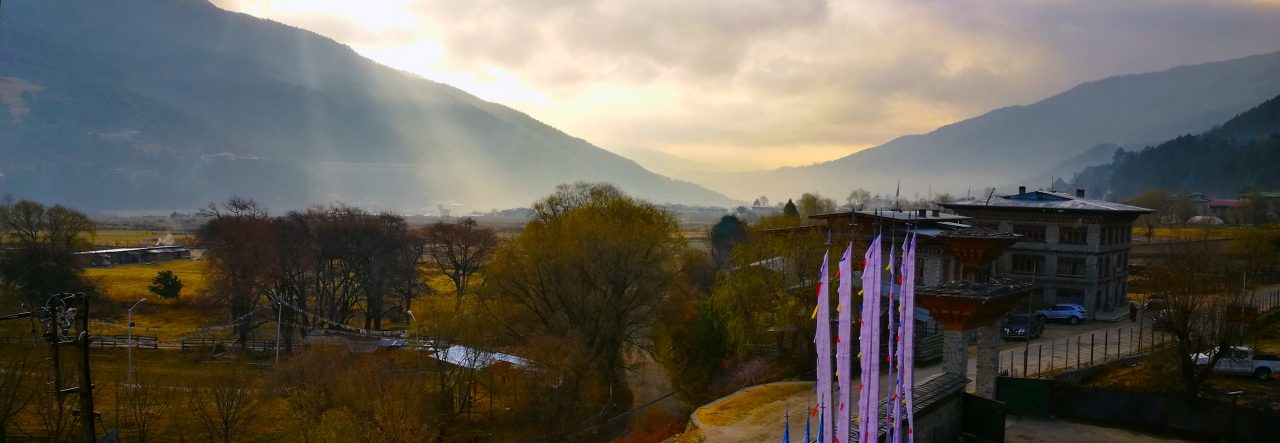The famed Athang Tsho (lake) is a beautiful subtropical lake, and some 6 acres in size, in Athang Gewog in lower Wangdue. It is located above Lopoka village on a plateau at the edge of several paddy fields.
The legend:
Legend has it that the tshomen (literally meaning Lake Woman, but referring to the deity of the lake) moved here from a distant place where there was no peace or sanctity because of sacrilegious acts by the locals. Disguised as a young highland girl, with a herd of yaks, she arrived in Phaktakha village in Athang and sought shelter for the night in a house belonging to an old lady. The lady offered a room in the basement.
Next morning when the old lady went to check on the girl, the latter was nowhere to be seen and instead a small pool of water was in the basement. She then rushed out of the house and to her astonishment found her rice fields were covered with a huge lake. The yaks were there but not the girl. The old lady instantly knew she was dealing with a tshomen.
Angry and mad, she called out to the tshomen and told her to come out of the lake. The girl appeared and told the old lady that she found this place to be very pure and peaceful and begged her to let her stay. As a price for the land on which the lake was to be hosted, the girl offered a horse that laid a golden egg every month, plus the yaks. There was only one condition: the old lady must never reveal the horse to anyone and was to be kept hidden away in the basement. The old lady agreed and accepted the offer.
As months and years passed the old lady increasingly became wealthy and was the talk and suspicion of the village and then the valley. No one understood how, but in one village gathering the old lady accidentally revealed something that made everyone curious. When she was standing up to leave, she was asked why the hurry or the need to leave? She made a slip of tongue and told them that she needed to feed the horse. The villagers always knew that she never owned a horse and so, one of them decided to snoop in. He found that she in fact did own one in the basement and to his great surprise the horse also laid a golden egg.
As the horse left the house and the village, however, it refused to move and the men pushed and flogged the horse till the next mountain. At a point from where the lake can be last seen the horse is believed to have wept. On this spot a small lake was formed. The place is still visible today.
From here there are two versions of the story. One that says that the horse died of intense flogging and the other that claims that the horse was beheaded after it refused to move. Whichever is the correct one, there is a grassland with a peculiar grass that is reddish in colour. This is believed to be the blood stain of the horse after its hide was spread here to dry.
The saddle and the sling of the horse were believed to be in Wangdue Dzong. And the house, or the descendants, of the old lady are believed to be in Phaktakha, a village just above the lake.
Social and cultural significance:
The lake is believed to be the Lhatsho of Peling tradition of Vajrayana Buddhism and hence it is a very sacred lake. Until the late twentieth century it was a mandatory pilgrimage destination for the Lhalung Sungtruel line of lamas and the reincarnation of Thuksey Rimpoches. The valley received lots of pilgrims from Tibet and from other parts of Bhutan. This explains the prosperity of Athang region, which despite its remoteness had the fame of producing lots of Wangdue Dzongpons and noble families.
Locals consider the lake as the most important part of their village. They say that the Tshomen has made Athang gewog very prosperous since ancient time despite a very small population. Even today, The sacred lake is believed to bestow the devotees the blessings of wealth, beauty and loyalty. It is also very much part of the local mood too. When there is an impending death or a pandemic the lake has been seen to change its color to a dark hue.
There is a simple altar built at the lake for people to conduct simple rituals and ceremonies. I recommend the Riwo Sangchoe prayers that are believed to bless honour the nature around and the non-human forces and spirits.
Getting there:
The total drive time from Thimphu is just 4 hours making it a nice day trip. There is a farm road that takes off from Kamichu on Wangdue-Tsirang highway. It is pliable with small cars (maybe not during the wet season).
When you get down to the Athang valley floor, from the Lapsaka Pass, look for a signboard. The road to the left is to Lomtsokha where there is the Chana Dorje temple of Morokha. To go to the lake. turn right. After the bridge, take the right at the next crossroad. There is a 5-minute walk from where the road ends.
This trip is highly recommended, as you can tie up with a visit to the sacred Morokha Temple in the same area, where there is the relic statue of Chana Dorje – believed to have flown there from Bumthang.
What to take:
Get plenty of plain cooked rice, plain crackers or sweet biscuits for the fish population in the lake. Make sure there is no salt on anything you feed.
And, of course, fresh cow milk for the Tshomen (Lake Woman), and incense sticks.





